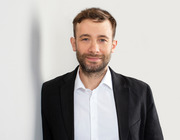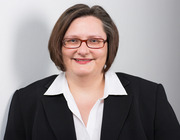Bloody street battles in Kiev, a government that uses force against its own people, scores of wounded and dead – those are just some of the troubling developments in Ukraine that have dominated the news in recent days. While foreign ministers from EU member states convened a special meeting to impose sanctions against the country's political leaders and others responsible for the violence, German Foreign Minister Frank-Walter Steinmeier and his counterparts from Poland, Radoslaw Sikorski, and France, Laurent Fabius, were hard at work coming up with a political solution. The result is a proposal for ending Ukraine's power struggle. Its recommendations include forming an interim government, revamping the country's constitution and holding parliamentary and presidential elections. Ukrainian President Viktor Yanukovych and the opposition would both have to approve the proposed solution.
EU member states from Central and Eastern Europe are also following the developments with grave concern. Hungary, for example, is afraid the unrest could send a wave of refugee its way, an event the country is already preparing for, not least because Ukraine is home to 150,000 ethnic Hungarians. Aid organizations in neighboring Poland are calling for donations to help Ukrainian victims of the unrest. A few days ago, Poles and Ukrainians held a joint protest in front of the Ukrainian Embassy in Warsaw. To show their support for opponents of the government in Kiev, some 300 people blocked the Polish-Ukrainian border crossing at Korczowa-Krakovets. According to information released by Poland's border police, the demonstrators set up a blockade in Ukraine, a short distance from the border to the EU, then burned tires stacked in the street near the blockade. Ukraine's authorities responded by closing the border, and people trying to enter Ukraine were instructed to use a different crossing. "Politically speaking, it's a huge missed opportunity," Sikorski said, commenting on the developments in Ukraine following this week's first wave of clashes.
On behalf of the Bertelsmann Stiftung, the Institute of Public Affairs (ISP) in Warsaw has carried out a study of the role society at large is playing in Ukrainian politics, including the impact social media have had in recent weeks and months. The authors' concluding recommendation is that the EU should do more as part of its Neighbourhood Policy to engage with the Ukrainian public directly, actively involving it in processes of reform. The study also notes that the EU could improve its credibility among the general population by eliminating visa requirements for Ukrainian citizens as soon as the country's authorities fulfill their obligations as laid out in the action plan for visa liberalization. On behalf of the Bertelsmann Stiftung, the ISP also carried out interviews with public figures in Poland in order to gain additional insight into the situation in Kiev.
Any "life preserver" offered by the EU – such as the announcement that visas are no longer required – would have an even greater impact given that 72 percent of Ukrainians no longer believe in the independence of their country's judiciary. The Bertelsmann Stiftung's recently released Transformation Index (BTI) also contains clear recommendations for legal reforms in Ukraine. Among other observations, the authors say the country would be better off signing the partnership agreement with the EU instead of entering into a Eurasian trade association with Russia, Belarus and Kazakhstan.
Together with the Konrad Adenauer Foundation, the Bertelsmann Stiftung has invited opposition leader Vitali Klitschko to participate in a public discussion on March 1 in Paderborn.




